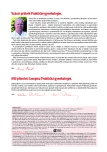-
Medical journals
- Career
Screening of sporadic colorectal cancer in Czech Republic
Authors: Přemysl Frič 1; Miroslav Zavoral 1; Štěpán Suchánek 1; Bohumil Seifert 2; Ladislav Dušek 3; Ondřej Májek 3
Authors‘ workplace: Interní klinika 1. LF UK a Ústřední vojenská nemocnice-Vojenská fakultní nemocnice, Praha 1; Ústav všeobecného lékařství 1. LF UK, Praha 2; Institut biostatistiky a analýz, LF MU, Brno 3
Published in: Prakt Gyn 2013; 17(4): 333-336
Category: Varia: Review article
Overview
Screening of sporadic colorectal cancer was introduced in Czech Republic already in the eighties of the 20th century. National program started as part of a free-of-charge preventive examination in 2000. At present the program includes in subjects 50–54 years of age an annual fecal occult blood test followed by colonoscopy in case of positivity. Since 55 years of age the proband may choose between biannual occult blood test followed by colonoscopy in case of positivity or the primary screening colonoscopy at 10 years´ interval. The coverage of the target population attained 25 per cent in 2011. Since 2009 the program was accepted also by ambulatory gynecologists. The screening program enables diagnosis at an earlier stage, improves prognosis and lowers the expenses of health and social care.
Key words:
Czech Republic – national screening program – sporadic colorectal cancer
Sources
1. Bond JH: Fecal adult blood testing for colorectal cancer. Can we afford not to do this? Gastroenterol Clin North Am 1997; 26(1): 57–70.
2. Frič P. The use of Haemoccult test in the early diagnosis of colorectal cancer – experience from six pilot studies in Czechoslovakia. In: Hardcastle JD (ed). Haemoccult screening for the early detection of colorectal cancer. Schattauer: Stuttgart – New York 1986.
3. Frič P, Zoubek V, Dvořáková H et al. Náklady a užitek depistáže kolorektálních nádorů Haemoccult testem u asymptomatických jedinců ve věku 45–60 let. Čas Lék Čes 1991; 130 : 370–373.
4. Frič P, Zavoral M, Dvořáková H et al. An adapted program of colorectal cancer screening – 7 years experience and cost-benefit analysis. Hepatogastroenterology1994; 41(5): 413–416.
5. Frič P, Zavoral M, Čekal J et al. Screening kolorektálního kacinomu v současném systému zdravotní péče (Pražský projekt). Endoskopie 1999; 8 : 39–45.
6. Frič P, Zavoral M: Screening kolorektálního karcinomu: projekce zahraničních zkušeností – jak se lze poučit, jak dále? Prakt Lék 2002; 82(4): 203–204.
7. Deyhle P. Das Dickdarmkarzinom – Diagnose, Prognose, Prophylaxe. Internist 1979; 20 : 39–43.
8. Zavoral M, Suchánek Š, Májek O et al. Populační screening kolorektálního karcinomu v České republice. Rozhl Chir 2009; 88 : 292–294.
9. Oháňková E, Hanáková T, Šuster P, Čadílek H. Gynekologové odhalují kolorektální karcinomy. Medical Tribune 16/2010, 28. 06. 2010. Dostupné z WWW: <http://www.tribune.cz/clanek/18345>.
10. Kovářová JT. Screening kolorektálního karcinomu v ordinaci praktického gynekologa – který test je ten pravý? Čes Gynek 2011; 76(2): 157–161.
Labels
Paediatric gynaecology Gynaecology and obstetrics Reproduction medicine
Article was published inPractical Gynecology

2013 Issue 4-
All articles in this issue
- Risk of thrombosis in association with oral contraceptive use from hematologist΄s point of view
- Can contraception to impact demographics dates?
- Obstetrical anesthesia – Czech Republic versus world
- Stillbirth – persistent problem of perinatal care
- Pharmacological options to reduce blood loss in laparoscopic myectomy
- Pelvic exenteration and female sexuality
- Traffic injuries of the pregnant women
- Principles and results of National register of assisted reproduction
- Avastin in first-line treatment of metastatic breast cancer – our experiences: case report
- Expectations of expectant mothers versus the hospital reality in case the planned caesarean section
- Screening of sporadic colorectal cancer in Czech Republic
- Authors´index
- Reviewers´ index
- Key words index
- Organization of Medical Care in the Field of Assisted Reproduction in Ukraine (Myth and Reality)
- Practical Gynecology
- Journal archive
- Current issue
- Online only
- About the journal
Most read in this issue- Risk of thrombosis in association with oral contraceptive use from hematologist΄s point of view
- Stillbirth – persistent problem of perinatal care
- Principles and results of National register of assisted reproduction
- Obstetrical anesthesia – Czech Republic versus world
Login#ADS_BOTTOM_SCRIPTS#Forgotten passwordEnter the email address that you registered with. We will send you instructions on how to set a new password.
- Career

